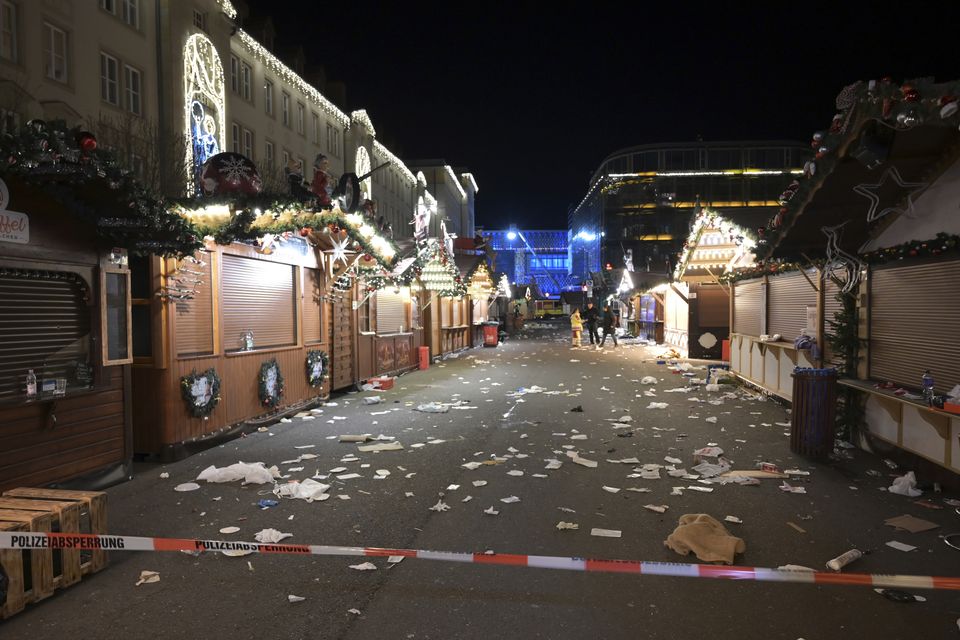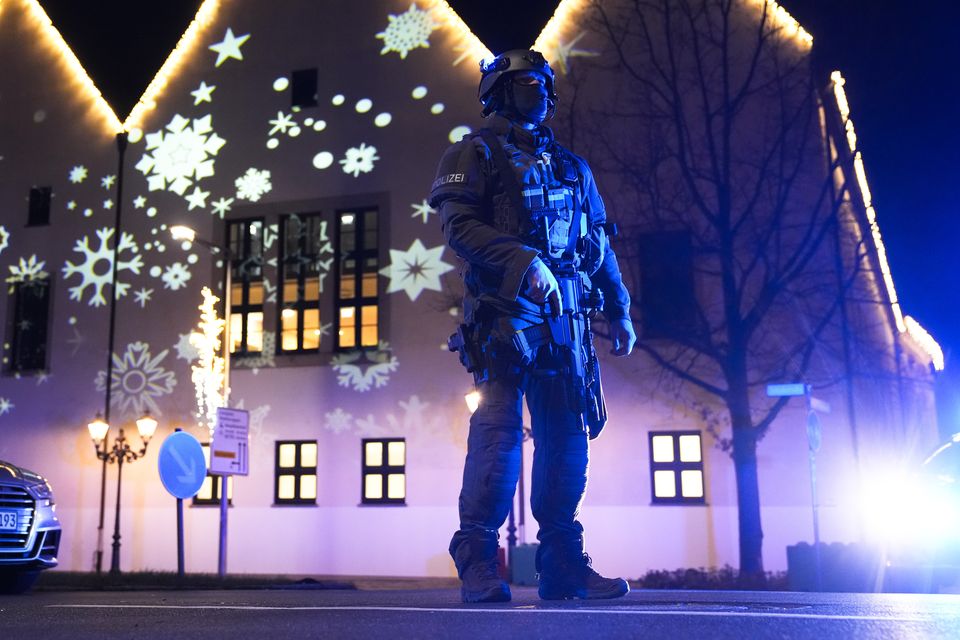The death toll in the attack on a busy Christmas market in the German city of Magdeburg has risen to five.
Saxony-Anhalt governor Reiner Haseloff also said that more than 200 people in total were injured, many seriously, when a Saudi doctor intentionally drove a black BMW into the market on Friday evening.
Chancellor Olaf Scholz said that nearly 40 of them “are so seriously injured that we must be very worried about them”.
Authorities identified the suspect as a 50-year-old who has been living in Germany for nearly two decades and practising medicine there.
He was arrested on Friday evening at the site of the attack as medical officials tended to the injured, and was taken into custody for questioning.
Several German media outlets identified the man as Taleb A, withholding his last name in line with privacy laws, and reported that he was a specialist in psychiatry and psychotherapy.
There were still no answers on Saturday as to what caused him to drive into a crowd in the eastern German city of Magdeburg.
Describing himself as a former Muslim, he shared dozens of tweets and retweets daily focusing on anti-Islam themes, criticising the religion and congratulating Muslims who left the faith.
He also accused German authorities of failing to do enough to combat what he said was the “Islamism of Europe”. Some described him as an activist who helped Saudi women flee their homeland. He has also voiced support for the far-right and anti-immigrant Alternative for Germany (AfD) party.
Recently, he seemed focused on his theory that German authorities have been targeting Saudi asylum seekers.
Prominent German terrorism expert Peter Neumann said he had yet to come across a suspect in an act of mass violence with that profile.
“After 25 years in this ‘business’ you think nothing could surprise you anymore. But a 50-year-old Saudi ex-Muslim who lives in East Germany, loves the AfD and wants to punish Germany for its tolerance towards Islamists — that really wasn’t on my radar,” Mr Neumann, the director of the International Centre for the Study of Radicalisation and Political Violence at King’s College London, wrote on X.
The violence shocked the country and the city, bringing its mayor to the verge of tears and marring a festive event that is part of a centuries-old German tradition.
The cordoned-off Christmas market in Magdeburg (Heiko Rebsch/dpa via AP)
Mourners lit candles and placed flowers outside a church near the market on Saturday. Several people stopped and cried. A Berlin church choir whose members witnessed a previous Christmas market attack in 2016 sang Amazing Grace, a hymn about God’s mercy, offering their prayers and solidarity with the victims.
It prompted several other German towns to cancel their weekend Christmas markets as a precaution and out of solidarity with Magdeburg’s loss.
Chancellor Olaf Scholz and Interior Minister Nancy Faeser were due to travel to Magdeburg on Saturday and a memorial service is to take place in the city cathedral in the evening.
“My thoughts are with the victims and their relatives,” Mr Scholz wrote on X. “We stand beside them and beside the people of Magdeburg.”
Magdeburg is a city of about 240,000 people, west of Berlin, that serves as Saxony-Anhalt’s capital.
Friday’s attack came eight years after an Islamic extremist drove a truck into a crowded Christmas market in Berlin, killing 13 people and injuring many others. The attacker was killed days later in a shootout in Italy.
Verified bystander footage distributed by the German news agency dpa showed the suspect’s arrest at a tram stop in the middle of the road.
A nearby police officer pointing a handgun at the man shouted at him as he lay prone, his head arched up slightly. Other officers soon arrived and took the man into custody.
“As things stand, he is a lone perpetrator, so that as far as we know there is no further danger to the city,” Saxony-Anhalt’s governor Reiner Haseloff told reporters. “Every human life that has fallen victim to this attack is a terrible tragedy and one human life too many.”
Authorities identified the suspect as a 50-year-old Saudi doctor who moved to Germany in 2006 and who had been practising medicine in Bernburg, about 25 miles south of Magdeburg.
A police officer guards a cordoned-off area of the market in Magdeburg (Ebrahim Noroozi/AP)
Saudi Arabia’s foreign ministry condemned the attack on X but did not mention the suspect’s connection to the kingdom.
Christmas markets are a German holiday tradition cherished since the Middle Ages, now successfully exported to much of the Western world.
Hours after Friday’s tragedy, the wail of sirens clashed with the market’s festive ornaments, stars and leafy garlands.
Magdeburg resident Dorin Steffen told dpa that she was at a concert in a nearby church when she heard the sirens. The cacophony was so loud “you had to assume that something terrible had happened”, she said.
She called the attack “a dark day” for the city.
“We are shaking,” Ms Steffen said. “Full of sympathy for the relatives, also in the hope that nothing has happened to our relatives, friends and acquaintances.”
The attack reverberated far beyond Magdeburg, with Mr Haseloff calling it a catastrophe for the city, state and country. He said flags would be lowered to half-staff in Saxony-Anhalt and that the federal government planned to do the same.
“It is really one of the worst things one can imagine, particularly in connection with what a Christmas market should bring,” the governor said.

